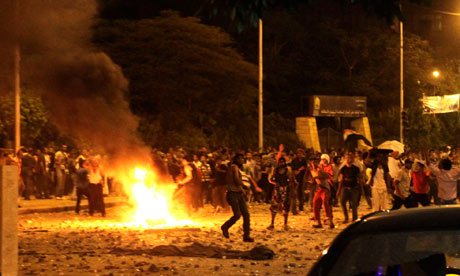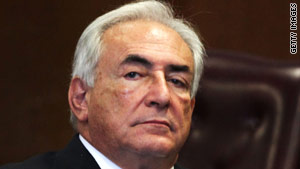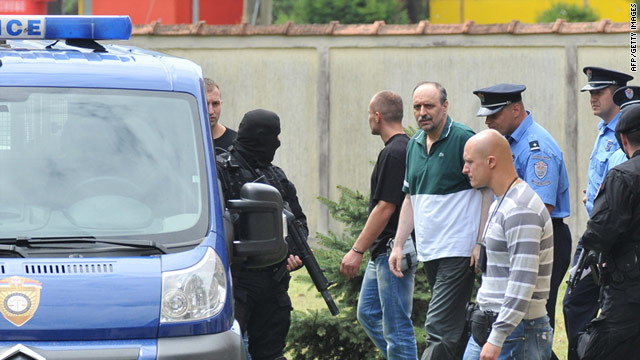
By Nick Thorpe BBC News, Lazarevo, Serbia
"I could have killed 10 of you if I wanted..." Ratko Mladic told the Serbian policemen who came to arrest him. "But I didn't want to. You're just young men, doing your job."
Nenad Stocovic tends peppers in the Mladic garden - but says he did not know he was there
Speaking in a BBC interview, Nenad Stocovic, a next-door neighbour who was with Gen Mladic for four hours during his arrest in the village of Lazarevo on 26 May, has given more details of the events of that morning.
It was a momentous day, when one of the world's biggest manhunts came to an end, and the man accused of committing genocide in Bosnia began his journey to face justice in The Hague.
It was 0500 on a Friday morning. Nenad Stocovic had come down to the garden adjacent to where, as it would turn out, Ratko Mladic was staying with his third cousin, Branko.
Nenad came to water his peppers - "the elephant's ear variety" he tells me proudly, showing the size and shape with his hand. "When suddenly there were policemen everywhere, four in uniform, about 10 in plainclothes."
"'Did someone get killed?' I asked them, 'or have you come to buy a pig or a sheep from Branko?'"
His request to leave quietly was rejected by the tall policeman in charge.
Two pistols
"They had no body armour, no helmets, no long-barrelled guns... but they seemed afraid. And they were surprised when they found him."
Mladic on trial
“Start Quote
If we had known, we would have made sure he was moved to a safer house... where the police would never have found him”
End Quote”
Nenad Stocovic
Ratko Mladic was sitting in the front room, wearing a tracksuit. His first words to the police were: "I am the man you are looking for." He seemed relieved to be have been discovered, Mr Stocovic tells me.
During the hours which followed, they asked him to sit first outside in the yard of the house, then back inside the room. Three other houses in the village were searched simultaneously.
The tip-off - if that was what brought the police here - appears to have been that Gen Mladic was in the village, not which house he was in. The other houses searched all belong to other, distant relatives of the general.
"The police were polite at all times," Mr Stocovic continues, "treating him almost like a father."
Gen Mladic's two pistols, one American made, with three clips of ammunition, 54 bullets, the other a Yugoslav Zastava 765, were found in a drawer of the closet.

Ratko Mladic seemed relieved to have been discovered, Nenad Stocovic said
"When the police inspector asked about it, he said the pistol was a gift of a volunteer in our army."
This was far from Gen Mladic's first visit to the village, but definitely the first time it had been searched by the Serbian authorities, in his 16 years on the run.
Around 10 years ago, Gen Mladic came here often, to stay with Branko, and kept his bees near the railway station.
"He walked openly in the streets, everyone knew who he was," Mr Stocovic explains.
"Once I told one of his bodyguards that his gun - a Heckler and Koch - was showing, protruding from under his jacket.
"'It is meant to be,' he said, coolly."
That was the period when either the political will to arrest him did not exist, or when the price - the potential loss of the lives in the police operation; or a nationalist backlash - was deemed too high.
Another bodyguard stood at the edge of the field at that time, and a third, in a white shirt, in the road. It was clear they wanted people to know they were there - 10 years ago.
Paralysis
Under arrest this time, Gen Mladic was not handcuffed, and the police complied with his request not to lay hands on him or shackle him in any way.
Police had never searched the house before, despite its connection with Mladic Mr Stocovic and Branko helped him put on a feather jacket, before they took him away. The paralysis in one of his arms made it hard to dress.
"Which one of you is the American?" the general asked the police - little surprise that after 16 years on the run, he could only imagine being taken into custody as part of a Western conspiracy.
Another interesting detail is that Gen Mladic's son Darko had visited Lazarevo very recently, on 6 and 7 May, to celebrate the family's patron saint - St George.
For a village so closely connected to the Mladic family, and where he was known to have visited, it seems astonishing that the Serbian authorities had never searched it before.
"Did you really not know that Mladic was in the village?" I asked Mr Stocovic, in conclusion.
"If we had, we would have made sure he was moved to a safer house, not connected to his relatives, where the police would never have found him," he replies.
Before I go, he says he has a message for the journalists of the world.
"You can help us a lot, but you can also do us a lot of damage. All I ask is that you tell the truth. Only the truth will extinguish the fires. This is the message of a self-educated man."
Background
Video and audio














 Murdoch in 1960, with the Sydney tabloid his rivals hoped would sink him
Murdoch in 1960, with the Sydney tabloid his rivals hoped would sink him 
 The sleepy city where Mr Murdoch's rise began - Adelaide in the 1950s
The sleepy city where Mr Murdoch's rise began - Adelaide in the 1950s  The path to power - Murdoch meets President Kennedy in the early 1960s
The path to power - Murdoch meets President Kennedy in the early 1960s 

 MPs voted to ban veils on the grounds of security
MPs voted to ban veils on the grounds of security  Very few Muslim women actually wear full veils in France and Belgium
Very few Muslim women actually wear full veils in France and Belgium 




